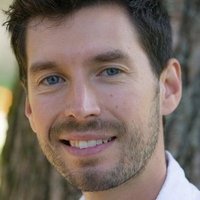
The problems of life leave a bad taste in our mouths—we shudder, resist and recoil away from anything negative because it causes pain.
But the people who are able to face their pain and learn from it are those who truly achieve mastery and fulfilment.
Each person has a unique genetic and environmental background that creates their identity. We all have unique interests and abilities, as well as unique experiences from which we learn. Our genetic and environmental backgrounds sometimes seem to drag us down in our life experience and at other times they seem to help us. I guess it all depends on the environment—an artist may have been rejected in Sparta but a brute warrior may have been rejected in the high society of Athens.
Family and society may value certain abilities we possess and they may reject other aspects of our personalities. We try to change our behaviors and develop skills to fit into society, but sometimes it’s really hard.
In Native American society it probably would have been really weird if an elementary age kid sat in the long-house all day instead of doing physical activities. But if a kid is restless in school in modern society, they may be diagnosed with a hyperactivity disorder.
What if the attributes that society views as “bad” are actually the keys to a super-power?
The Diagnostic and Statistical Manual for Mental Disorders has around 300 classifications for mental problems. When people differ from the norm, we create a label for the deviance to help us understand it. Sometimes these classifications seem arbitrary and what is a disorder to some, may be a super-power to others.
Make no mistake, there are people with major problems. If one is hurtful to oneself or others or their behavior affects their quality of life, there is a problem. But lets look at the experiences and behaviors that deviate from the norm and how we can learn from them.
Allow me use my own quirks as an example. I’ve been known to be a bit…obsessive. It first showed itself when I started reading for 12 hours at a time in middle school. When I got internet access, my obsessive curiosity turned into massive research marathons. This curiosity has led me to learn quite a bit, but when it was not balanced by other attributes such as exercise and socialization, it became unhealthy.
I’m also a very sensitive person. I don’t mean that I cry when I get tackled in football. I mean that I perceive more sensory information than the average person. For example, I might hear more things, notice minute details, and then analyze and interpret all of this information while other people are happily focusing on a few aspects of their surroundings. This super-power has given me the ability to be a musician, poet, read people’s emotional state and so much more. It has also been debilitating at times when less sensitive people are having a great time at a party. I’ve learned to expose myself to challenging situations and still use care so that I don’t get too overwhelmed.
Any attribute that is taken to the extreme or is not balanced out by another attribute will cause problems.
Some people’s attributes are more extreme than others and it can take years to learn how to balance them or learn from them. Some use medication, develop skills, expose themselves to growth situations, or even partner with people who have complementary attributes.
Our mental health issues are alarms that tell us to learn a certain lesson. If one has a phobia, the lesson may be to face fear or face the past. If one has anxiety, it may be to face the unknown or learn to feel and release emotions. Whatever issues one has, they are the keys to greatness. As Napoleon Hill said, “In every adversity there is a seed for an equivalent or greater benefit.”
If I wasn’t obsessive or super-sensitive I never would have been chronically depressed. But I also never would have learned so much or been able to write a book.
I could have been ashamed by my attributes and rejected myself. At times I did that and it never helped. Eventually, I learned to channel the energy in a positive direction. At the same time, I challenged myself to grow, build my deficits, and balance my attributes with other ones. For example, I have to be very intentional to stop thinking so much by doing mindfulness-based practices. I also have to be very intentional to do physical exercise and socialize, otherwise I’ll just read and write all day.
By shining the light of awareness on gifts and deficits, one learns to balance them. By recognizing where energy is supercharged in our systems, we can balance and direct it toward positive purposes. Once we know how unique and amazing we are, it’s just a matter of fine tuning the machine of our beings for high-performance.
It seems humanity has been learning about this for a long time. Carved into granite at the ancient religious site of Delphi are the creeds: “Know thyself,” and “Nothing in excess.”
We all have unique gifts and deficits—my father can spell virtually any word, but he doesn’t have the attention-span to finish a novel but I, on the other hand, can’t spell very well at all, but I can read a novel in a sitting. That gives each of us an advantage in some situations and a disadvantage in others.
By learning about ourselves, valuing our gifts and learning to balance our attributes, we can turn a disorder into a super-power.
Relephant:
8 Natural Tips for Coping with Anxiety.
How it Feels to Have Anxiety in a Relationship.
~
Author: Sean Morgan
Editor: Katarina Tavčar
Photo: Alex/Flickr






Read 4 comments and reply